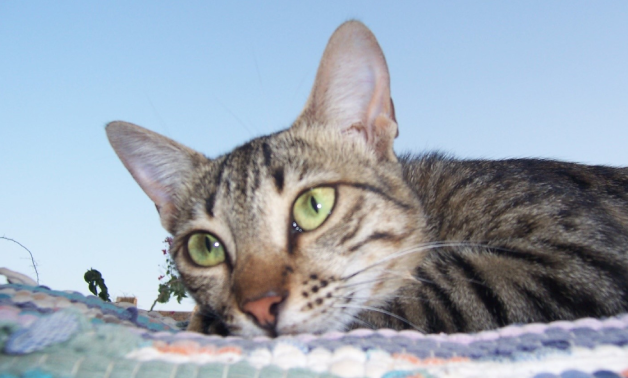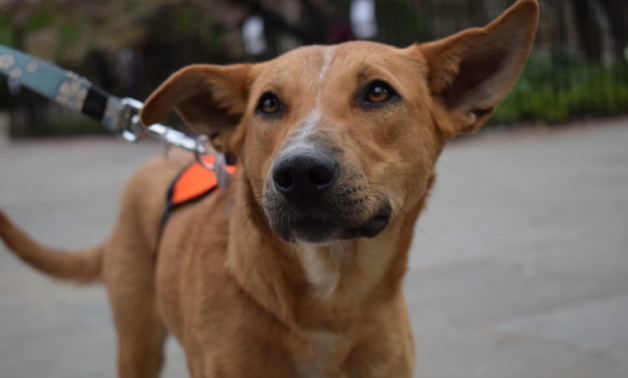What’s in a Breed? Why We Should Be Choosing Baladi
By Kenzy Fahmy
Egyptians’ relationship to domesticated cats and dogs, like so many things, goes all the way back to the time of the ancients, when their association with the gods meant they were both revered and protected; the relationship was a sacred one, and it was an important one.
Pharaonic temples all over Egypt have their walls and columns adorned with images of cats and dogs, a testament to the major role they played in the daily life of Egyptians, which was reflected heavily in their religious and spiritual importance. DNA analysis has even shown recently just how far back the genetic lineage of our baladis goes, with one sample containing DNA that can be traced back to 15,000 years ago. The cats and dogs you see on the streets today are direct descendants of those you see on ancient inscriptions and records, the very same breed that has been immortalized in the form of granite statues and carvings on 4,000 year-old rocks.
Centuries later, and many still find cats and dogs at the center of their lives. There is plenty of research linking pets to improvements in physical and mental health, and they can play an important role in keeping our homes and streets free from pests. It’s a symbiotic relationship that has evolved over millennia to create a bond between us and our non-human counterparts that is, by now, virtually unbreakable.
What has changed, though, is our obsession with pure-breeds, whether canine or feline. We’ve tampered with genetic lines to the point where many breeds are now known for the severe health problems they will inevitably face. From chronic breathing problems to renal disease and fragile bones, pure breeds are notorious for their genetic vulnerability.
The perception people have towards baladi cats and dogs is also changing, thankfully, and people are becoming more aware, not only of the good it does to adopt and rescue, but also of the traits that make the breeds so special. Because their genes haven’t been tampered with to fit our own needs, they have evolved into intelligent, resilient and incredibly loving companions, perfectly adapted to the environment around them. The Egyptian Mau and Egyptian Baladi Dog are actually both ancient and highly sought-after breeds, known around the world for their high intelligence, physical strength and agility, as well as their good looks. But appreciation for them here in Egypt is still limited to a minority of people, and many still prefer to buy pure-breeds from pet shops or directly from the breeders themselves, leaving the stray population to suffer.
There is also the issue of taking breeds that have evolved to live in certain environments and placing them in an environment they aren’t well-adapted to. The popularity of Huskies in Egypt is a prime example; we’ve taken a dog that has evolved to live in subzero temperatures, and forced it to live in a country where the average temperature doesn’t drop below 10 degrees.
Even worse is the issue of the breeding itself, where 9 times out of 10, the breeder’s profit takes precedence over the safety and wellbeing of the animal. There are horror stories about what goes on behind the scenes and it’s an industry that significantly adds to the already shocking list of abuses that take place towards animals. And all too often, this is all for the sake of owning a status symbol, of similar value to the owner as a designer handbag.
Of course, that’s not to say that all who choose to buy breeds do so for selfish reasons or don’t really love their pets. That’s very often far from the case. The harm comes from supporting an industry that does so much damage and perpetuating practices that are cruel and inhumane.
And on the other side of this, you have an ever-growing population of stray cats and dogs that must also face atrocities living in the streets. Aggression towards them only teaches them to be aggressive towards us, which leads to incidents that trigger mass culling campaigns where entire neighbourhoods lose large numbers of strays overnight to poison, many of whom are being fed and cared for by residents.
To tackle problems like these, we’ve seen the rise of movements like ‘Adopt, Don’t Shop’ and campaigns to shut down pet stores that keep animals in inhumane conditions. The Ministry of Environment has even set up a hotline (19808) so people can report incidents of animal abuse and illegal trading in pet shops.
Awareness campaigns are constantly taking place with the goal of shifting the public’s perception of baladi dogs and cats, dogs of course more so, urging people to stop buying pure-breeds and to consider adopting instead. Not only would we be giving a home to an animal in need, we’ll be contributing positively to the management and safety of our streets, and we’ll be adding a loving new member to our own home.
So if you have space in your life and home for a furry companion, choose baladi, because baladi really is best. Stay tuned for next week’s post where we’ll give you some tips on how to contribute to the cause.




